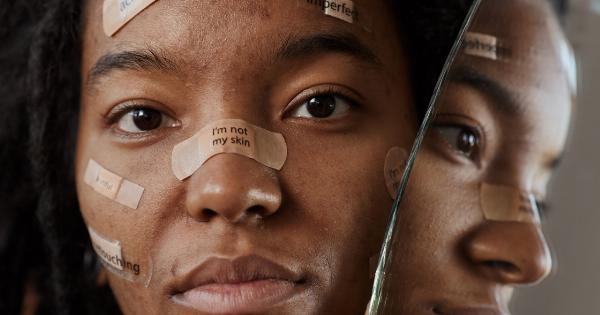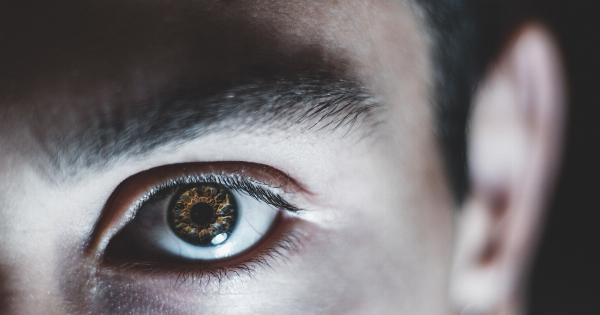Acne is a common skin condition that affects millions of people worldwide. It is especially prevalent during adolescence but can persist into adulthood as well.
While acne is often associated with the face, it can also occur on other parts of the body, such as the back, chest, shoulders, and buttocks. Body acne can be just as frustrating and embarrassing as facial acne, but fortunately, there are effective strategies to help clear it up.
The Causes of Body Acne
Body acne, like facial acne, is primarily caused by the overproduction of oil (sebum) in the skin’s oil glands.
When excess oil, dead skin cells, and bacteria accumulate in the pores, it can lead to inflammation, redness, and the formation of pimples. However, there are several factors that can contribute to the development of body acne:.
Tight Clothing
Wearing tight clothing can create friction and increase sweating, which can clog pores and lead to acne breakouts. It is advisable to opt for loose-fitting, breathable clothing made from natural fabrics like cotton to reduce the risk of body acne.
Poor Hygiene
Inadequate hygiene practices can result in the buildup of bacteria and dirt on the skin, contributing to acne formation.
It is essential to shower regularly and cleanse the body with a mild, non-comedogenic cleanser to remove impurities and maintain a clean, healthy complexion.
Sweating and Moisture
Excessive sweating, especially when combined with tight clothing, can create a humid environment that promotes the growth of acne-causing bacteria.
After sweating, it is crucial to shower or at least cleanse the skin to prevent pore blockage and breakouts.
Genetics
Family history plays a significant role in determining an individual’s susceptibility to acne. If your parents or siblings have had body acne, you may be more prone to developing it as well.
However, genetics is not the sole determining factor, and lifestyle choices can still influence the severity and frequency of breakouts.
Hormonal Changes
Fluctuations in hormone levels can trigger acne outbreaks. This is why body acne often occurs during puberty when hormone production increases.
Hormonal imbalances can also arise during certain times of a woman’s menstrual cycle or due to hormonal disorders such as polycystic ovary syndrome (PCOS).
Effective Strategies for Clearing Up Body Acne
While body acne can be bothersome, there are several strategies that have proven effective in clearing up breakouts and preventing future ones.
It may require some trial and error to find the best approach for your specific skin type, but the following methods are known to be beneficial:.
1. Gentle Cleansing
Start by gently cleansing the affected areas with a mild, non-comedogenic cleanser. Avoid harsh soaps or cleansers that can strip the skin of essential oils, as this may worsen acne.
Look for products that contain ingredients like salicylic acid or benzoyl peroxide, which can help remove excess oil and bacteria.
2. Exfoliation
Regular exfoliation helps remove dead skin cells, unclog pores, and prevent acne formation. However, it is essential to choose gentle exfoliants specifically designed for the body to avoid irritation or inflammation.
Consider using an exfoliating scrub or a body wash with exfoliating properties a few times a week.
3. Benzoyl Peroxide
Benzoyl peroxide is a potent ingredient that effectively kills acne-causing bacteria. It also helps reduce inflammation and remove excess oil. Apply a thin layer of benzoyl peroxide cream or gel to the affected areas after cleansing.
Start with a lower concentration to prevent skin irritation and gradually increase as tolerated.
4. Salicylic Acid
Salicylic acid is another popular ingredient in acne treatments. It helps unclog pores, reduce inflammation, and promote skin cell turnover. Look for body washes, sprays, or lotions containing salicylic acid and use them regularly to minimize breakouts.
5. Moisturizing
Contrary to popular belief, moisturizing is still essential, even for acne-prone skin. Opt for oil-free or non-comedogenic moisturizers that won’t clog pores or exacerbate acne.
Keeping the skin adequately hydrated helps maintain a healthy barrier and can prevent excessive oil production.
6. Avoid Irritants
Avoid using heavily scented body products, as the added fragrance can irritate the skin and potentially worsen acne.
Similarly, try to steer clear of harsh laundry detergents or fabric softeners that can leave residue on clothing, leading to pore blockage.
7. Loose Clothing
Wear loose-fitting clothing made from breathable fabrics like cotton to allow better air circulation and reduce the risk of sweat and oil buildup on the skin.
Avoid wearing tight bras, backpacks, or headbands that can trap sweat and heat against the body.
8. Clean Bedding
Regularly washing your bedding, including sheets, pillowcases, and blankets, is crucial in preventing body acne. Dead skin cells, oils, and dirt can accumulate on bedding and transfer back onto your skin, potentially leading to breakouts.
Aim to wash bedding at least once a week.
9. Treat Acne-Prone Areas with Care
Be gentle with your skin, especially in areas prone to acne breakouts. Avoid excessive scrubbing or picking at pimples, as this can cause inflammation and scarring. Use a soft towel to pat dry the skin after showering, and avoid aggressive rubbing.
10. Seek Professional Help
If over-the-counter treatments and home remedies do not provide satisfactory results, consider consulting a dermatologist.
Dermatologists are specialized in treating various skin conditions and can recommend prescription-strength medications or procedures to help clear up body acne.
Final Thoughts
Clearing up body acne requires dedication and consistency in adopting effective skincare practices.
Finding the right combination of cleansing, exfoliating, and treatment products may take time, but with patience, you can achieve clearer, healthier skin. Remember that everyone’s skin is unique, so what works for one person may not work for another.
Don’t hesitate to seek professional advice if needed, as dermatologists can provide personalized recommendations based on your specific skin type and concerns.




























